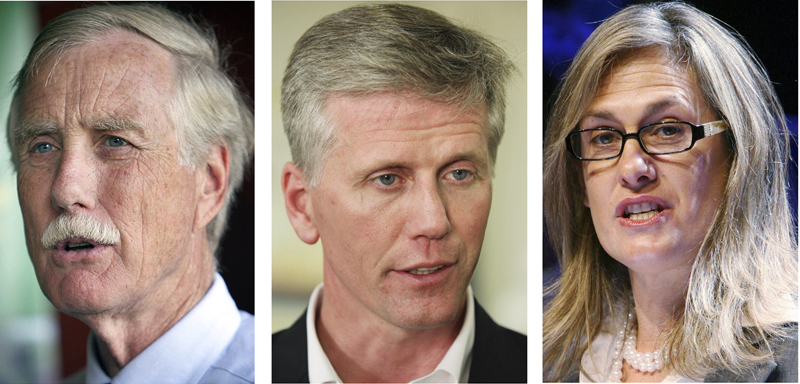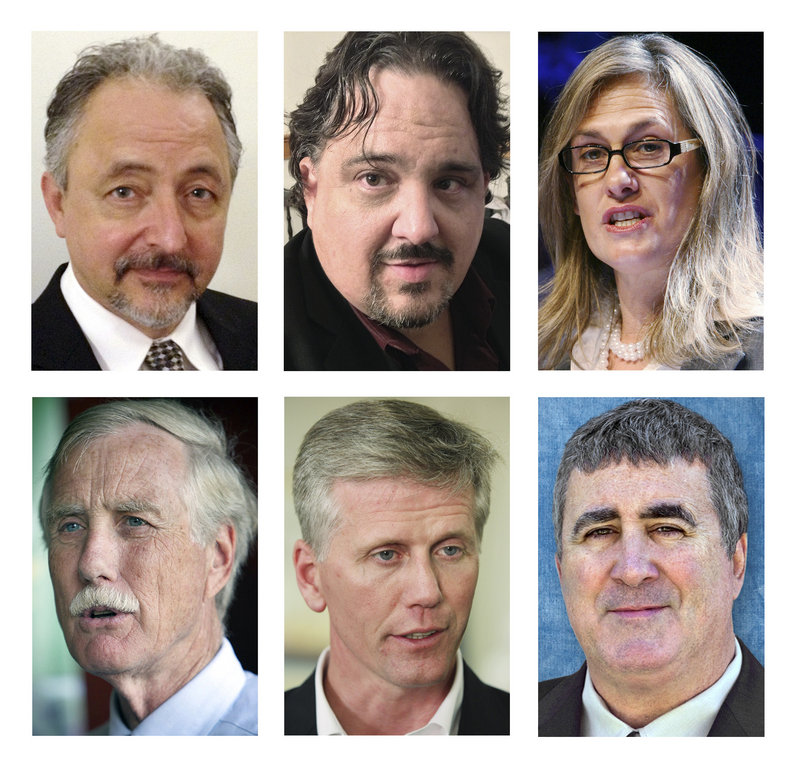Maine’s major U.S. Senate candidates agree on the need to reduce America’s dependence on imported oil, but they disagree about what should replace it with and how to get there.
Democrat Cynthia Dill and independent Angus King want Congress to support clean, renewable energy technologies to help replace oil. But while King supports expanded natural gas production as a transition fuel, Dill says the extraction method is too risky for the environment.
Republican Charlie Summers wants to replace foreign oil with whatever domestic sources can compete in the market, including oil, gas, nuclear power and renewables.
Energy is an important issue for voters in Maine, where high oil prices are having an especially big impact on family budgets and the state economy. Maine remains more dependent on heating oil than any other state, with about 70 percent of homes burning oil for heat.
Heating oil prices have inched up to an average of $3.76 a gallon statewide, and the U.S. Energy Information Administration has projected that it will cost more to heat with oil this winter than any winter on record.
Mainers also are heavily reliant on cars — and gasoline — to get around in a rural state with little public transportation. Gasoline now costs an average of $3.76 a gallon, 21 cents more than a year ago and about $1 more than two years ago.
Here is a closer look at what the major candidates for Maine’s open U.S. Senate seat have been saying about energy policy:
THE DEMOCRAT
Dill says the country must promote clean, renewable sources of energy and reject environmentally risky oil and gas development.
Dill supports federal subsidies for new domestic energy sources such as wind and tidal, and wants to end subsidies for fossil fuels.
“Government can play a role in leading the United States to energy independence by making smart investments,” she said at a forum on energy issues in September. “It’s high time that subsidies to oil and gas companies be ended.”
Dill says the Obama administration deserves credit for expanding domestic production of oil and natural gas in the last four years, but she wouldn’t expand oil or gas production in ways that pose unnecessary environmental risks.
She opposes opening new areas such as the Alaska National Wildlife Refuge to oil drilling, for example.
She said climate change is clearly being fueled by humans and presents “the biggest threat to civilized society.”
She opposes the extraction of natural gas by fracturing bedrock, a process known as fracking, saying it is too risky for the environment.
Dill also opposes the proposed Keystone XL pipeline, which would carry Canadian tar sands oil through the United States. The project would not create American jobs but would perpetuate the dependence on fossil fuels and present “a huge environmental risk,” she says.
Dill also opposes nuclear power development, saying there is no solution to the radioactive waste disposal problem.
THE INDEPENDENT
King says he wants to move the country away from oil and transition to renewable, domestic sources of energy.
He has called natural gas a transitional fuel that can reduce oil imports and lower energy costs in the short run.
“(Gas) gives us an unparalleled opportunity to get off oil and coal,” King said at the energy forum in September.
He says fracking can be done safely if it’s properly regulated.
King has said that moving away from oil is critical to the economy and the environment. The science linking energy use to climate change is clear, he says.
He opposes opening new areas such as the Alaska National Wildlife Refuge to oil drilling, saying the output would be too small to make a difference in supply or price.
King also opposes nuclear power development, saying it is more expensive than other technologies and there is no waste disposal solution.
He supports extending and expanding tax credits for new technologies such as wind and tidal power development. He opposes subsidies for the oil industry, saying it is well established and doesn’t need continued support.
The Keystone XL pipeline should be allowed to carry tar sands oil from Canada through the United States if it meets environmental standards and gets approval from the affected states, King says.
King founded an energy conservation business, which he sold in 1994, and co-founded a wind power development business, which he divested from earlier this year.
Republicans have criticized King’s energy connections, accusing him of exploiting federal subsidies as a private developer and supporting the use of natural gas because he serves on the board of directors of an environmental engineering company.
King has denied any personal gain from public subsidies and said his political positions on energy are based on science.
THE REPUBLICAN
Summers wants to expand domestic energy production and reduce oil imports as a matter of national security.
“In effect, we’re paying the people we’re fighting against,” Summers said at the forum on energy issues. “We need to be looking for energy sources here in the United States.”
Summers, a commander in the Naval Reserve who has served in Iraq and Afghanistan, says he supports development of all domestic sources, including oil and gas, coal, renewables and nuclear power. He says Europeans have shown that nuclear power can be safe and efficient.
He wants to open more areas to oil drilling, including the Alaska National Wildlife Refuge. He supports expanded natural-gas production through fracking.
He is less concerned about moving away from oil and coal for environmental reasons, saying he does not believe humans are the primary cause of climate change because other factors also are at work.
Summers says he opposes subsidies for wind power and other renewables that cannot compete in the marketplace.
On the other hand, he has defended subsidies for oil production, saying the industry employs “millions of people” and will continue to fuel the economy for the foreseeable future.
Staff Writer John Richardson can be contacted at 791-6324 or at:
jrichardson@pressherald.com
Send questions/comments to the editors.




Comments are no longer available on this story